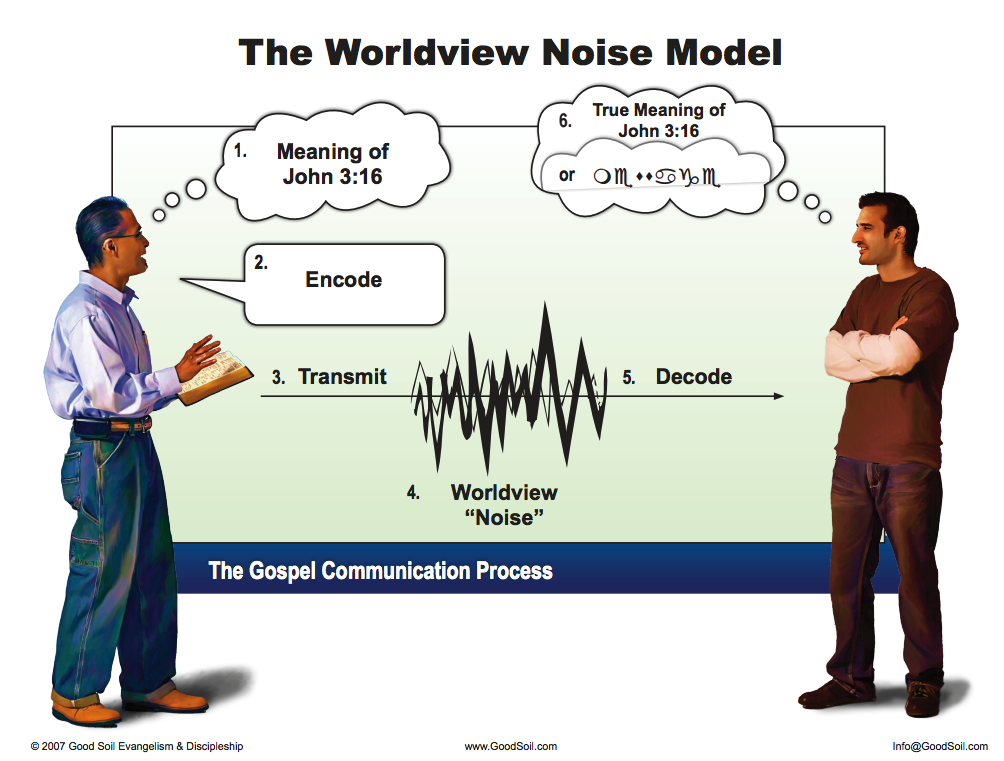Do you know Jesus? Probably not! At least not in the way you think.
Now before you call me a heretic take a minute to watch the video below, I think it will help you understand where I’m coming from.
While this video from David Lopez is funny, it also demonstrates a common problem that we face when we try to share the gospel. I mentioned this recently in a podcast called “I Met Jesus and This Is What He looks like”
Worldview noise
In our training seminars on evangelism we call this problem “Worldview noise” or “Gospel static.” This happens when we try to share the gospel with someone who has a different worldview from us. The greater the difference in our two worldviews, the greater the worldview noise will be.
For instance in the above video people ask simple questions about Jesus.
- Do you know Jesus?
- Did you know that Jesus died for you?
- Have you heard that Jesus is risen?
- Do you know that Jesus loves you?
- I’m in love with Jesus!
Within an American Christian worldview it’s clear who these people are referring to, they’re talking about the Jesus that we find in the four Gospels, the Jesus who lived 2000 years ago in the Middle East and who was crucified by the Romans! It’s likely that if you’re reading this blog post you had no problem understanding that they were talking about the Jesus of the New Testament, that’s because you probably share enough of a common worldview to be able to make the proper connections even with little context.
However, as you can see in the video, the young man appears to be from a Spanish speaking background. He has a different worldview. When these people mention the name “Jesus” he doesn’t think about the first century Rabbi who was crucified for his teachings. Rather he thinks about his friend or his cousin who is named “Jesús.”
This example may seem a little extreme but it illustrates the point well. If you don’t know the worldview of the person you’re trying to share the gospel with, there is a great chance that you might miscommunicate some important truths. 
Learn to Identify Worldviews
In our evangelism training seminars one of the things we talk about is learning how to identify worldviews. If you can identify the worldview of the person you are talking to it will help you to more accurately communicate gospel truths to them in a way they can understand. It will also help you to know what possible misconceptions they have about important gospel issues so that you can work with them to correct those misconceptions.
This, however means that we must do the work of identifying the worldviews of those that we want to share the gospel with. How can you do that? Let me give you a few tips.
-
Be a student
- Every evangelist needs to be a student of God’s Word and a student of people. It makes sense to study some of the
 common worldviews, especially those that you may often encounter in your context. You can find great pdf containing a summary of major worldviews and how to share the gospel with them from the Good Soil website here.
common worldviews, especially those that you may often encounter in your context. You can find great pdf containing a summary of major worldviews and how to share the gospel with them from the Good Soil website here.
- Every evangelist needs to be a student of God’s Word and a student of people. It makes sense to study some of the
-
Be observant
- Nothing beats paying close attention. How are they dressed? What country are they from? Did they mention any religious beliefs? Who are their friends? Etc… Paying attention to the details can often help you better understand the worldview of the person you’re talking with.
-
Ask questions
- Rather than dominating the conversation and forcing the gospel message upon them learn to engage the person in conversation. Ask appropriate questions about themselves, their family, their work, and they’re believes. If someone is open to talking it may not take long to find out their worldview.
- For help on how to ask investigative questions and start gospel conversations check out this post on the Good Soil blog.
Now you can ask
Once you have identified the worldview you may want to ask if they know Jesus or you may not. For instance, if you find out that the person has an atheistic worldview then it wouldn’t make sense to immediately talk to them about Jesus. You will first want to talk with them about the fact that there is a God who made the heavens and the earth.
If the person’s worldview is Postmodern you’ll want to first show that not all truths are relative and that there are indeed some universal truths, otherwise what’s the point of telling him about Jesus since that’s just “your truth.”
If the person’s worldview is polytheism you’ll want to first establish the fact that there is one God alone. Otherwise if you introduce Jesus, they’ll just add him to the God’s they already have.
I think you get the idea. Having a proper understanding of the person’s worldview helps you know where to start in a gospel conversation. Without knowing something about the worldview of the person you’re talking to you are bound to miscommunicate the message and you’ll probably enter the conversation at the wrong spot.











